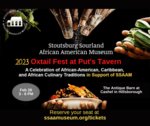

Stoutsburg Sourland African American Museum (SSAAM), Central New Jersey’s first and only Black history museum, in Skillman, N.J., will celebrate Black History Month with the return of Oxtail Fest at Put’s Tavern, at 3 p.m. Sunday, Feb. 26.
Oxtail is literally the meat from the tail of a cow. While oxtail has been used by many cultures spanning the globe for centuries, today, it stands out as a distinctly African American and Caribbean culinary delicacy and tradition. Oxtail epitomizes eating low on the hog—enslaved people cooking were forced to eat the unwanted cast-off cuts of meat that would otherwise be fed to the animals or discarded—while the enslavers ate the choice cuts, high on the hog.
What the enslavers did not understand was that this gelatin-rich meat they discarded, when prepared properly, yields some of the most flavorful and succulent delights of any beef dish. As oxtail is also popular on the African continent, thus it is likely that the enslaved knew exactly how to prepare this delicious meat. African traditions slow cook oxtail, rendering “a most tender meat, glorious on the palate, richly flavored, in a delectable au jus.”
Like many staples of working class food traditions, this once inexpensive cut that was practically given away by butchers, has now undergone gentrification and the price per pound has skyrocketed, making oxtail only affordable to many only on special occasions.
The feast will feature an African American/Caribbean fusion oxtail preparation, and a Cuban-style rabo encendido, which literally means “tail on fire” (the spice is mild for the Cuban dish). Guests will choose between SSAAM’s Executive Director Donnetta Johnson’s Southern/Jamaican fusion oxtail preparation derived from her mother’s recipe from Selma, Ala., and her father’s Trentown Jamaican family recipe. The Afro-Cuban Oxtail is prepared in a distinctive red sauce by event co-host and SSAAM board member Jackie Fay, from her mother’s Cubano family recipe.
The feast will include a rich variety of other specialties from the African and Afro-Latin diaspora, such as okra, Jollof rice, cornbread, croquetas, empanadas, sweet potato pie, bread pudding, among other sides and desserts. The menu will include a host of healthy vegan specialties as well.
A special signature drink will feature peaches and spirits — a nod to enslaved and freed African Americans who worked in the Sourland Mountain peach orchards, which were among four million trees throughout the state. Before the 1899 San Jose Scale blight, half of these orchards were located in Hunterdon County.
The Antique Barn at Cashel, a restored Hillsborough barn owned by event co-host Jen Bryson, will be staged for the occasion as Put’s Tavern, recalling the legendary 19th-century Black-owned tavern on Zion Road. Some say that this tavern was as infamous as it was famous.
In the late 1870s, it was run by the famed Slyvia Dubois, a clever, dynamic, and enigmatic African American woman who, as an enslaved woman, is reported to have turned the tables on her cruel and abusive mistress by beating her after suffering one too many indignities at her hands. It is reported that the mistress was so cruel that the family decided to emancipate Slyvia after the incident rather than punish her.
Dubois’ grandfather, Harry “Put” Compton, a formerly enslaved person and Revolutionary War veteran, who was reputed to be a fifer in the Battle of Princeton, started the tavern after the war. Put’s Tavern was a place near Rock Mills where the people of the Sourlands freely socialized with one another, regardless of race and color. The isolated indigenous, Black, and white people of the Sourlands created an interdependent, racially mixed, and integrated community that was unusually harmonious for the day, but not without issues.
Proceeds from SSAAM’s 2nd Oxtail Fest event will fund SSAAM operations, research, programming and the launch of its capital campaign to build the Stoutsburg Sourland African American Museum and Environmental Complex to preserve, protect and share African American history, structures and ecological treasures of the Sourland Mountain Region.
Event tickets and sponsorships are available now at ssaamuseum.org/tickets
Supporters can also contribute to the event by purchasing an ad in the Oxtail Fest Sourland Journal.
Join our readers whose generous donations are making it possible for you to read our news coverage. Help keep local journalism alive and our community strong. Donate today.